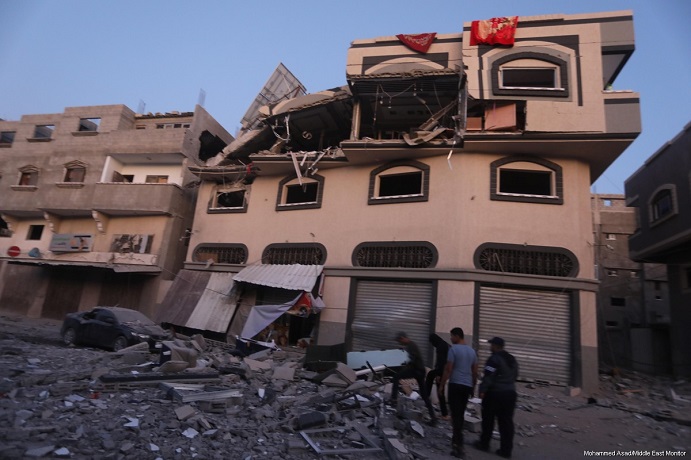
Middle East Monitor / November 12, 2019
In a surprise attack today, the Israeli air force assassinated Bahaa Abu Al-Ata, an Islamic Jihad military official in northern Gaza. Israel accused him of firing rockets. Al-Ata’s wife was also killed in the attack. The killings have prompted Palestinian resistance factions to threaten an immediate response.
The Israel Defence Forces (IDF) noted that the assassination was approved by “Prime Minister and Defence Minister” Benjamin Netanyahu. This means that it was approved before new Defence Minister Naftali Bennett took office.
In recent days, the security, military and political circles in Israel have clearly exaggerated Abu Al-Ata’s role in launching dozens of rocket-propelled grenades at Israeli settlements, coupled with warnings that he could be assassinated. Daily reports described him as being another Mohammed Deif, referring to the military commander of the Izz ad-Din al-Qassam Brigades, the armed wing of Hamas. Others claim that he was the most dangerous person alongside Hezbollah’s Hassan Nasrallah and Qasem Soleimani, a senior officer in Iran’s Revolutionary Guards Corps.
Israeli security and military officials reported that Abu Al-Ata was involved in planning attacks against the state, oversaw the manufacture of weapons and improved long-range rocket capabilities. He was said to be the decision-maker in firing rockets at Israeli settlements. The US imposed sanctions on him.
The assassination of Abu Al-Ata is only the tip of the iceberg of intensive Israeli attacks on Palestinians, the planning of which can take several months. Decisions to kill Palestinian resistance leaders come from the very top in Israel, namely the Prime Minister. They are not made spontaneously, but well in advance of the attacks. Those on people like Abu Al-Ata are likely to be multi-agency operations, with targets assessed and monitored to determine daily routines and thus the most likely locations for the attacks to take place.
The decision to assassinate Abu Al-Ata may well have been made after the incident in September when Netanyahu scrambled away from a ceremony in Ashdod when missiles were launched from Gaza. This was a major embarrassment for him in front of his Likud constituency during an election campaign.
Bahaa Abu Al-Ata was killed when missiles were fired at his home in the Shuja’iyya neighbourhood east of Gaza City. The head of Shin Bet, Israel’s domestic security agency, followed the assassination process closely, while the IDF announced that it was well prepared for the attack and any subsequent escalation; it is braced for several days of fighting.
It is worth recalling the Cabinet deliberations on Gaza in recent days, where the positions of the IDF and Shin Bet commanders were heard. They offered several options, including a return to assassinations, and the Cabinet made its operational decisions; no objections were put forward.
Earlier Cabinet reports demanded that the IDF should focus on the northern front, because it is more dangerous than Gaza. This was logical and relevant, but the advice was not taken. From that time, the Palestinians in Gaza should have been more cautious; they know how treacherous the Israelis are.
Given that Netanyahu is facing several difficult scenarios related to his future, political and legal considerations must have been taken into account in ordering the killing of Bahaa Abu Al-Ata. The Prime Minister will either go for a third General Election in less than a year that might not give him the chance to form the next government; spend the rest of his life in prison for corruption; or be ousted by the Likud party because his presence hinders the formation of a unity government with the Blue and White Party. This killing portrays him, he hopes, as the strongman that Israel needs to be in charge.
Israelis are divided in their reading of the killing of Abu Al-Ata, although most seem to have expressed their support. However, they are mistaken if they believe that the solution to ongoing security tension on the Gaza border is the murder of senior resistance figures. Assassinations will not stop armed resistance.
Indeed, the most that they can achieve is to calm terrified Israelis by proving that their security agencies are still relatively effective, while increasing the level of hatred and fear of Palestinians seeking freedom and independence, and the lifting of the siege of Gaza. Assassinations actually destroy the few remaining chances of success for the moribund “peace process”.
Despite the justifications provided by Israel for the resumption of “targeted killings”, it wants to cover up the security establishment’s failures on all fronts, whether in the Gaza Strip, the West Bank, Lebanon or Syria. What does it hope to gain by such operations? Israel is more aware than anyone else that killing leading Palestinians generates more hatred and provides more motives for revenge. This in turn will prompt more Israeli “responses” — ignoring the fact that cause and effect dictates that the occupation is the original cause, so it is the Palestinians who are “responding” to Israeli aggression — and so Israel implicates itself in creating an even more poisonous atmosphere in the Middle East. Palestinians, meanwhile, see the resistance groups diminishing the IDF’s much-vaunted deterrence factor. Israelis who defend assassinations should try to understand this.
Palestinian and Israeli observers agree that we are facing a more intense escalation in the field given that Israel has stepped up the level of aggression this time and crossed dangerous red lines with the first open assassination since the murder of the former commander of Al-Qassam Brigades, Ahmed Al-Jabari, in 2012. The violence escalated for at least a week after that attack. It is now likely to be even more serious, as the Palestinian resistance groups have developed their qualitative and quantitative missile capabilities in recent years. Israeli cities might see the result of this in the coming hours and days ahead.
Adnan Abu Amer is a Palestinian academic












